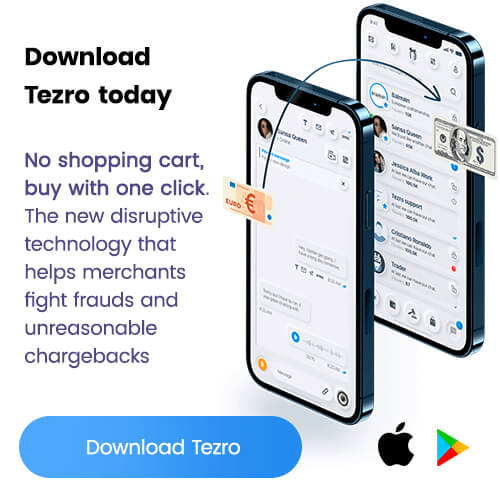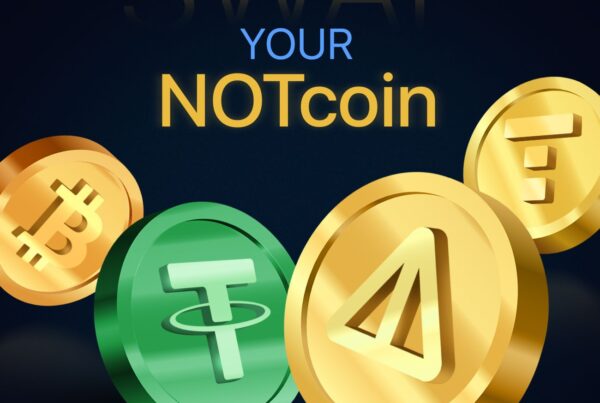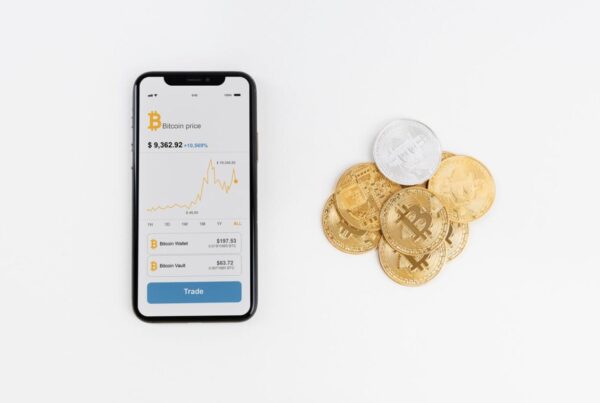If you are looking for the best XRP wallet in 2023, you probably know how hard it can be to find one that meets all of your needs. With so many options out there, it can be tough to know where to start.
Let’s look at the best XRP wallets in the market. We will explore what features they offer and how they can help you store your XRP safely.
By the end of this article, you should have a good idea of which wallet is right for you.
Best XRP Wallets in 2023
1. Tezro
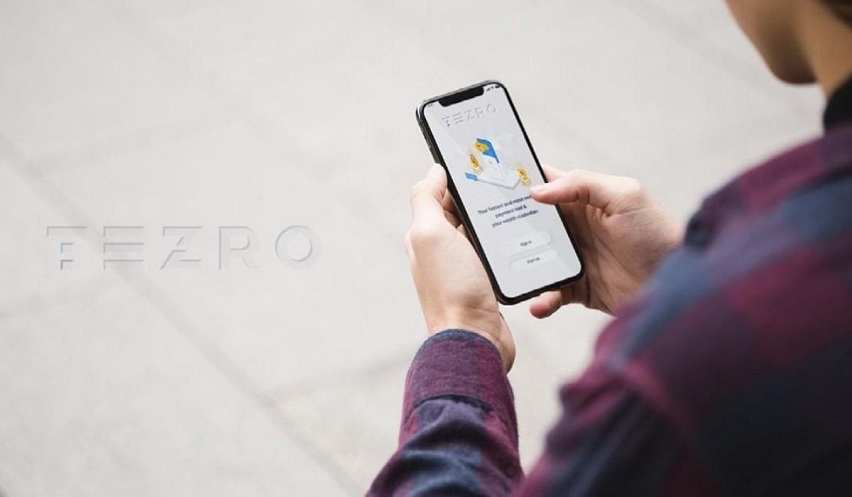
It is available as a desktop wallet for Windows, macOS, and Linux. There is also a dedicated mobile app for Android and iOS devices.
Features
Tezro uses a multi-signature security system to protect your XRP. This means that you will need more than one person to sign off on a transaction before it can be processed. This makes it much harder for hackers to gain access to your funds.
Another great feature of Tezro is that it allows you to hold multiple currencies. This can be handy if you want to diversify your portfolio or send payments in different currencies.
The user interface is also very intuitive and easy to use. This makes it a great option for those new to cryptocurrency wallets.
Pros
- Non-custodial: This wallet is non-custodial, which means that you are the only one who has control over your funds.
- Two-factor authentication: Tezro also offers two-factor authentication. This adds an extra layer of security to your account.
- Chat feature: The chat feature lets you easily get in touch with other users. You can also send and receive XRP through this disruptive feature.
Cons:
- Relatively new: This wallet is still relatively new. This might not be an issue for some users, but it is worth considering.
2. Trust Wallet
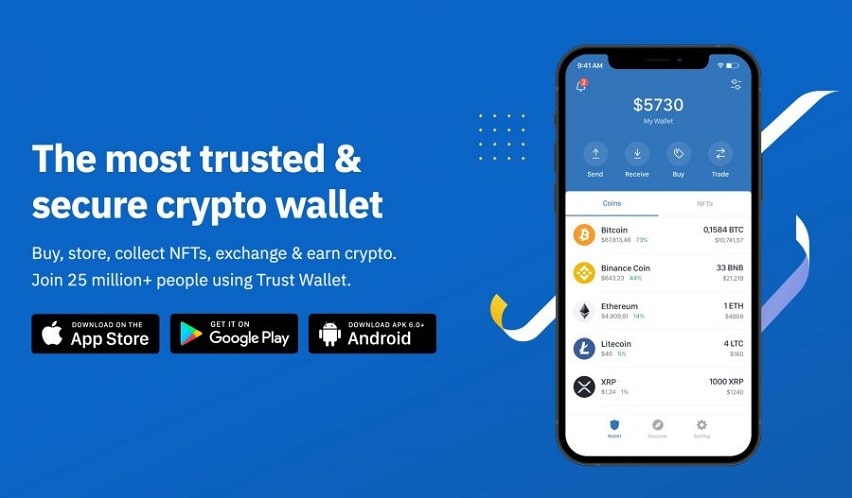
Features
Trust wallet is an open-source wallet. Therefore, its code is available for anyone to audit. Auditing means that security experts can check the code for vulnerabilities.
Another notable feature of this wallet is its built-in staking. This allows you to earn rewards just for holding your XRP in the wallet.
Lastly, Trust wallet offers an NFT storage feature. You can store your NFTs (non-fungible tokens) in the wallet and trade them with other users.
Pros:
- Easy to use: The Trust wallet is very easy to use. Even if you are new to cryptocurrency, you will be able to use it without any problems.
- Large number of supported assets: This wallet supports over 50 blockchains and over one million crytpos. This makes it a very versatile wallet.
- Great security: Apart from being a HD wallet, Trust wallet also uses two-factor authentication to further secure your account.
Cons:
- No cold storage: Trust wallet does not offer cold storage. This means that your XRP is stored on a server and is therefore vulnerable to hacking.
- Only available as an app: Trust wallet is only available as an app. This means that you cannot use it on your desktop computer. You can only use it on mobile devices and Apple Silicon computers.
3. Exodus
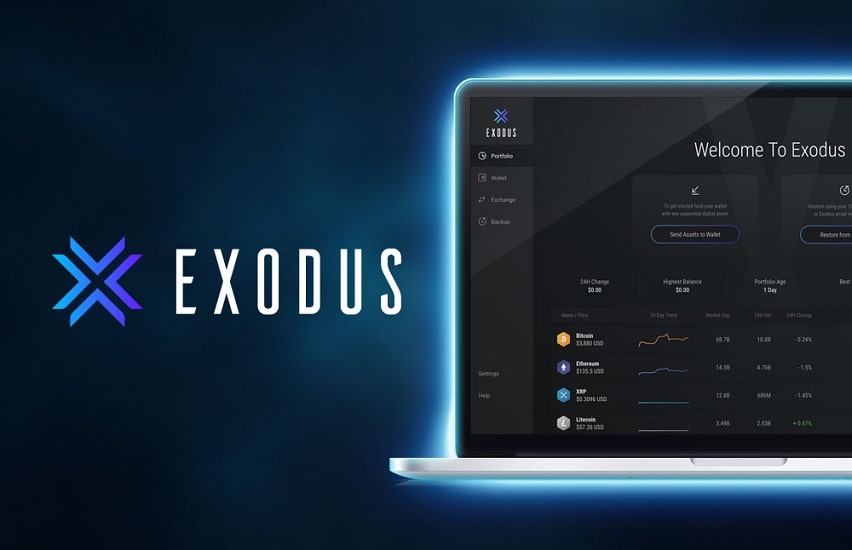
It has an intuitive and user-friendly interface that even beginners can use easily. The wallet also features a built-in exchange so you can easily trade your cryptocurrencies without using a separate platform.
Features
This wallet uses the non-custodial framework, meaning that only you can control your private keys. The framework works by encrypting your private keys and storing them on your device. Even the Exodus team cannot access your funds.
This wallet is also a Hierarchical Deterministic (HD) wallet, which means that it generates a new public key for each transaction. This makes it more secure than other wallets since it minimizes the risk of losing all your funds if your private key is compromised.
You can also easily back up your Exodus wallet by using a 12-word seed phrase. This phrase will give you access to your funds even if you lose your device or forget your password.
Pros:
- Support for hardware wallets: This wallet has partnered with Trezor, one of the most popular hardware wallets in the market. You can use Exodus with your Trezor device for added security.
- No KYC requirements: You do not need to go through a Know-Your-Customer (KYC) process to use this wallet.
- Linkage to DeFi: This wallet has partnered with DeFi platforms such as Maker, Compound, and Uniswap so you can easily use these platforms to earn interest on your cryptocurrencies or trade them.
Cons:
- No custom network fees for altcoins: While this wallet allows you to set custom network fees for Bitcoin transactions, it does not allow you to do the same for other altcoins.
- Can be slow: Some users have reported that Exodus can be slow, especially when sending or receiving large amounts of cryptocurrencies.
4. Ledger
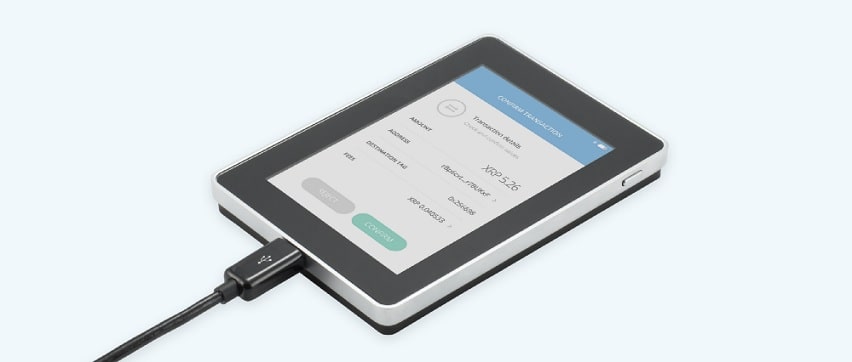
You can track your XRP balance and transactions on the Ledger Live app, which is available for desktop and mobile.
Features
Ledger hardware wallets are some of the most secure in the industry. They have a Secure Element chip that stores your private keys and signs transactions.
The Ledger Nano S and the Ledger Nano X also support two-factor authentication. This adds an extra layer of security to your account.
Ledger hardware wallets are compatible with a wide range of cryptocurrencies. In addition to XRP, you can store Bitcoin, Ethereum, Litecoin, and other altcoins on Ledger Nano devices.
In case you lose your Ledger device, you can restore your account on a new one using a 24-word recovery phrase. This phrase is generated when you set up your wallet and must be written down in a safe place.
Pros:
- Multicurrency wallet: Both Ledger Nano S and X support over 1,800 cryptocurrencies
- Easy to use: This wallet comes with a guided setup and an easy-to-use interface
- Small and lightweight: The Ledger Nano S is small and lightweight, making it easy to carry around
Cons:
- Expensive: Ledge Nano S costs around $59, and Ledger Nano X around $119. This might be too expensive for some people
- Not open source: The source code of the Ledger wallet is not available to the public. This might be a concern for some users
5. Atomic Wallet
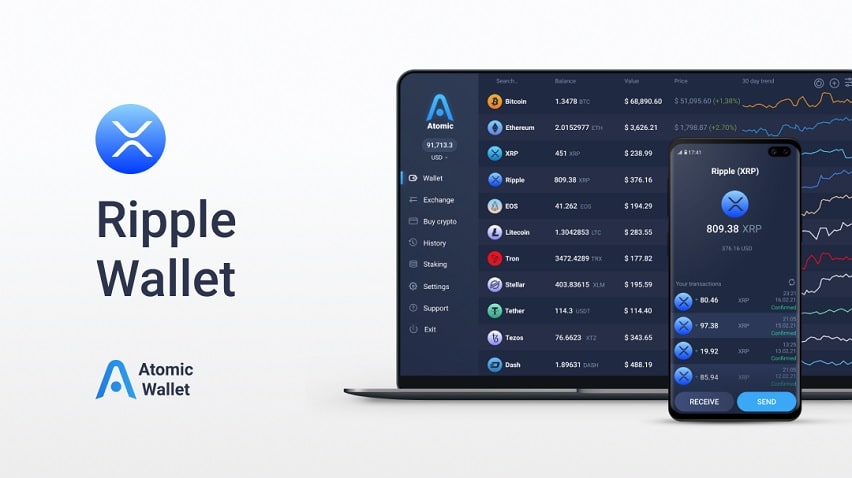
The desktop version is compatible with Windows, Linux, and Mac.
Features
It is an HD wallet supporting over 500 cryptocurrencies, including XRP. You can buy, store, exchange, and stake coins in the Atomic wallet. The private keys are stored on your device, making it a very secure option.
Users can recover their accounts using a 12-word seed phrase. This phrase is automatically generated and displayed when you create a new account.
Pros:
- Buy crypto feature: This wallet has a built-in exchange allowing users to buy XRP (and other cryptocurrencies) directly with a credit card.
- Multi-currency support: Supports over 500 cryptocurrencies, including XRP.
- Encrypted private keys: The private keys are stored on your device and are encrypted, adding an extra layer of security.
Cons:
- Not open-source: The wallet code is not open-source, so it cannot be audited by the community.
- Not hardware compatible: The wallet cannot be used with hardware wallets like Ledger or Trezor.
6. Trezor
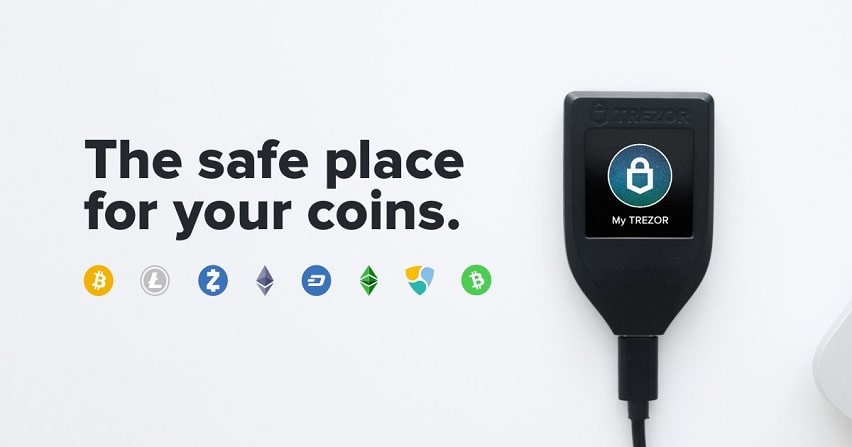
Features
The device has a small display where you can double-check and confirm all your transactions. It also comes with a PIN code in case you lose your device or someone tries to steal it.
Trezor generates a seed phrase offline which you can use to recover your funds if you lose your device. This 12-24 word phrase is generated by the Trezor device and displayed on the screen. You need to write it down and store it in a safe place.
Trezor comes with a password manager and two-factor authentication (via FIDO UAF or Google Authenticator).
Pros
- Encryption via GPG: Trezor can encrypt messages and files using the Gnu Privacy Guard (GPG).
- Multi-currency support: In addition to XRP, Trezor hardware wallets support a wide range of cryptocurrencies.
- U2F authentication: Trezor devices can be used as a UAF/U2F hardware token for two-factor authentication. This makes it one of the best crypto hardware wallet for XRP.
Cons
- Price: Trezor devices are some of the most expensive hardware wallets on the market.
- Setup process: The setup process is a bit long and complicated, especially for first-time users.
- Cashout via fiat can be tedious: Users who want to cash out their XRP will need to first convert it to BTC or another cryptocurrency, and then convert it to fiat currency. This process can be time-consuming and complicated for some users.
7. Electrum
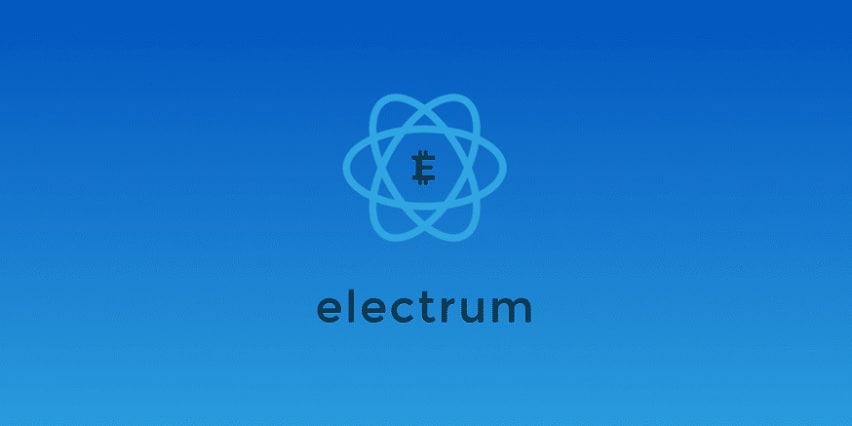
One great feature of Electrum is that it supports multi-signature wallets. This means you can require multiple signatures before a transaction is processed. Electrum also has support for hardware wallets like Ledger and Trezor.
Features
Electrum is an open-source wallet, which means developers can contribute to its code. This also means that anyone can audit the code to check for security vulnerabilities.
Electrum is a lightweight wallet, which means it doesn’t require you to download the entire blockchain of XRP. All you need is a connection to the internet.
Electrum uses a seed phrase to generate your private keys. This means you can backup your wallet with just 12 words. You can buy and sell XRP directly from within the Electrum wallet using the built-in exchange service.
Pros
- Widely used: Trusted by millions of users, Electrum is one of the most popular Bitcoin wallets.
- Privacy: Electrum doesn’t require any personal information to set up an account.
- Multi-signature support: Electrum supports multi-signature wallets, which adds an extra layer of security.
Cons
- Not beginner-friendly: Electrum is a great wallet for experienced users, but it may be confusing for beginners.
- Limited customer support: The Electrum team only provides email support.
8. Abra Wallet
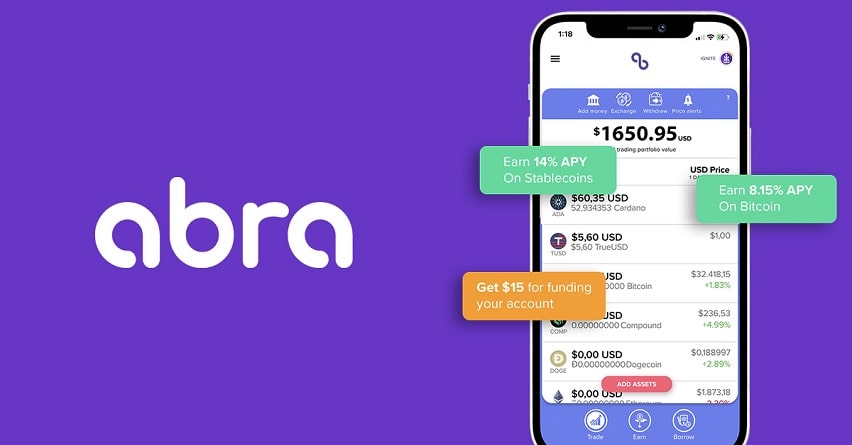
Features
One of the best features of the Abra wallet is that it allows you to borrow crypto for as low as 0% APR. This means you can borrow without compromising your crypto balance.
Abra is also a HD (hierarchical deterministic) wallet, which means that your private keys are generated and stored securely.
This wallet also supports NFTs (non-fungible tokens). Therefore, you can use the Abra wallet to store, buy, sell, or trade your favorite NFTs.
Pros:
- Non-custodial: Your private keys are stored on your device and not with a third-party
- Supports Fiat: This wallet supports over 70 fiat currencies
- Multi-currency support: This wallet supports over 80 cryptocurrencies
Cons:
- Not open-source: The Abra wallet is not open-source. Therefore, the code cannot be audited by the community.
- Limitations for some users: Users in some countries, such as the US, cannot invest in EFTs or stocks.
9. Crypterium Wallet
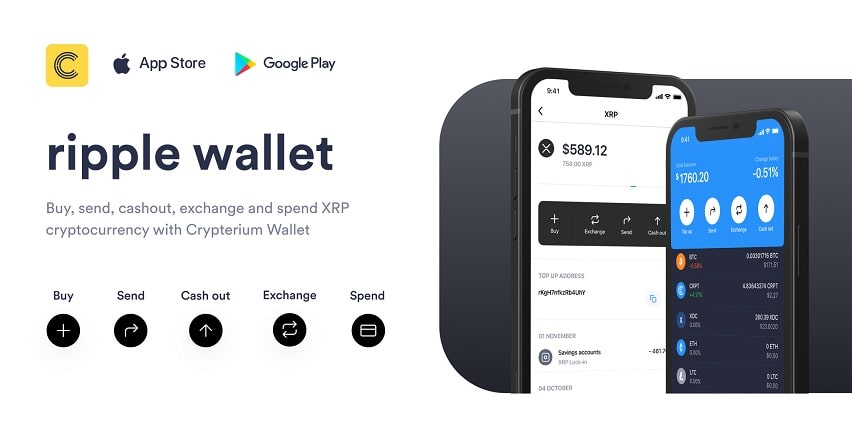
You can use the Crypterium wallet to store, send, and receive XRP, as well as other cryptocurrencies.
Features
This wallet combines traditional finances with cryptocurrencies, allowing you to use your crypto funds to pay bills or top up your phone. The wallet also has a built-in exchange that lets you quickly and easily convert between different digital assets.
Pros:
- Open-source: The code for the Crypterium wallet is available on GitHub, so anyone can audit it.
- Multi-platform: Regardless of which device you’re using, you can access your Crypterium wallet.
- Fiat gateway: You can use the Crypterium wallet to buy XRP with fiat currency using a credit or debit card.
Cons:
- Interface not as user-friendly as some other wallets: The interface takes a bit of getting used to, and may not be suitable for beginners.
10. Robinhood
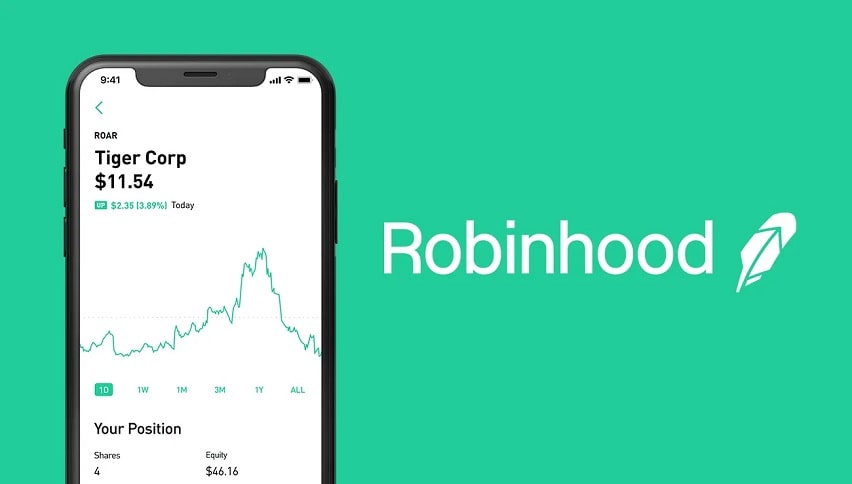
The Robinhood app has a user-friendly interface and allows you to buy, sell, and hold cryptocurrencies.
You can also use the Robinhood app to track the prices of various cryptocurrencies in real time.
Features
This wallet is packed with features that make it a great choice for those looking for a comprehensive and user-friendly crypto wallet. Its user-friendly interface and ability to track prices in real time make it a great choice for those new to the world of cryptocurrency.
In terms of security, the Robinhood app uses two-factor authentication to help keep your funds safe. Military-grade encryption is also used to protect your data.
Pros:
- Large community: Robinhood has a large community of users who are active on the app. This can be helpful if you’re looking for support or want to connect with other crypto investors.
- User-friendly: The Robinhood app is designed to be user-friendly, making it a great choice for those new to cryptocurrency investing.
- Privacy: Robinhood does not require you to provide your personal information when you sign up for an account.
Cons:
- Limited currencies: Robinhood only supports a limited number of cryptocurrencies, which may not be ideal for those looking to invest in a wide variety of digital assets.
- Transfers require verification: When you want to transfer funds out of your Robinhood account, you’ll need to verify your identity first. This can take some time and may not be ideal if you’re looking for a quick way to sell your crypto.
Types of XRP Wallets
- Hardware wallets: A hardware wallet is a physical device that stores your private keys and allows you to sign transactions.
- Software wallets: A software wallet is a digital wallet that you can use on your computer or mobile device.
- Paper wallets: A paper wallet is a physical copy of your private keys that you can store offline.
Frequently Asked Questions
What is the best cold wallet for XRP?
Ledger and Trezor are the best hardware wallets for XRP. They are both offline wallets, which means that your private keys are stored offline and are not at risk of being hacked.
What is the best crypto wallet for XRP?
Generally, Tezro and Exodus are considered to be the best software wallets for XRP. They are both user-friendly and support a wide range of other digital assets.
How does Ripple work?
Ripple is a decentralized network that allows for fast and cheap international payments. Ripple works by using a shared public ledger to record all the transactions that take place on the network.
Key Takeaways
- XRP wallets help you store your Ripple assets safely
- Ripple is a decentralized network for quick international payments.
- Choose your wallet based on security and anonymity.
- Diversify your wallets in many different wallets, so you will lower your chances of being hacked and losing all your crypto.
Final Thoughts
These are just some of the best XRP wallets. Use as many wallets as you need to keep your XRP safe.
And remember, always diversify your crypto portfolio to minimize risk. Download Tezro app to keep your assets safe and text your friends and acquaintances in a fully encrypted messaging service.







